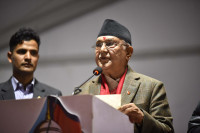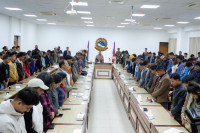Opinion
The loss-makers
A long-term strategy is required if moribund state-owned enterprises are to be revived
Shree Prasad Devkota & Nitesh Kumar Shah
The notion of least government interference in the economy was prevalent till the end of the 19th century. But this freedom started creating problems instead of bringing the desired results. Businesses focused on making profits using unfair trade practices and they were reluctant to get involved in public welfare and public utilities. Monopoly and market failures also emerged, requiring the government to participate in the economy by establishing public enterprises (PEs) to achieve economic and social goals. Most of the PEs in Nepal were formed between the 1960s and the 1980s. They were involved in the production of jute, sugar, leather, cigarettes, bricks, cement and textiles while some were involved in trading.
Although PEs were established with the objective of propelling the economy, they slowly became a burden on the state due to inefficient management. Most of them were overstaffed, and the government had to inject funds in the form of grants and loans. In this way, these firms were generating negative returns for the government. Multilateral international financing institutions like the World Bank and the International Monetary Fund urged deregulation. The initiation taken to privatise the PEs was tied with the economic liberalisation policies adopted in the 1990s.
Despite the flurry of privatisation, there are still 37 PEs in the country. However, excessive government intervention and politicisation have made them moribund. Bureaucratic hurdles and frequent interventions have contracted the freedom of the management, resulting in delayed decision making and low productivity. Another problem which has constrained the revival of PEs is lack of accountability. This means the employees don’t care about the future of the organisation. The Constitution states that the state is socialism oriented. This demands an active role of the government because the private sector alone will not produce equity and social justice. The government has recently declared that it will make Nepal self-reliant. This requires the proper utilisation of local resources and the creation of internal demand. This is not possible without reviving the PEs.
Recently, the industry minister declared that the government was preparing to bring Nepal Medicine, Hetauda Cement, Gorakhkali Tyre Industry, Udaypur Cement and Birgunj Sugar Mill back into operation. They should be revived in such a way that they can compete with private companies. A proper strategy will provide them direction. The scheme should be designed for the long term and should not be changed with a change in government. The government has also started looking for strategic partners for the Agricultural Development Bank and Nepal Telecom. At one time, Janakpur Cigarette Factory was the largest taxpayer, today it is nowhere in the picture. This year, Nepal Oil Corporation was able to earn a profit because oil prices fell in the international market but it did not cut domestic prices accordingly.
Meanwhile, consumer rights should be strengthened so that the public will not have to suffer from a decline in the quality of goods and services provided by government corporations. The Constitution and the budget statement both indicate that the government is coming up with freebies for social welfare and justice. But it needs to create wealth before it can distribute it. The most suitable way to create wealth would be to make PEs sustainable by making them profitable. The government should not shun making a profit in the name of welfare. However, it should not charge high prices to cover inefficiencies and loopholes.
Devkota holds an MPhil in development studies from Kathmandu University; Shah holds an MBA from Kathmandu University




 18.12°C Kathmandu
18.12°C Kathmandu










